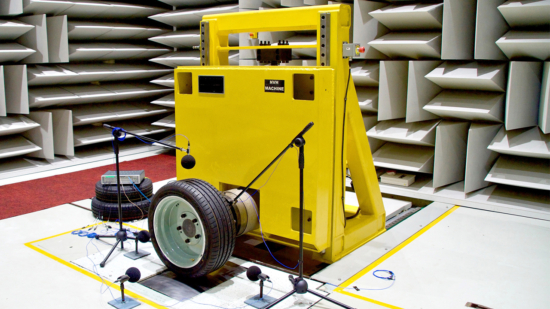NABL certifies HASETRI as ‘world’s first’ rolling resistance proficiency testing provider
 As well as achieving rolling resisting test capabilities, the HASETRI lab features noise and vibration assessment and testing facilities (Photo: HASERTRI)
As well as achieving rolling resisting test capabilities, the HASETRI lab features noise and vibration assessment and testing facilities (Photo: HASERTRI)
Hari Shankar Singhania Elastomer and Tyre Research Institute (HASETRI) has become the world’s first accredited Proficiency Testing Provider (PTP) for Rolling Resistance Tests by the National Accreditation Board for Testing and Calibration Laboratories (NABL). The unique certification has been awarded according to ISO 17043:2010 standards for C1 (passenger car tyres), C2 (light truck tyres), and C3 (heavy truck tyres) tests.
The significant certification, valid from 30 November 2023, to 29 November 2025, reportedly positions HASETRI “at the forefront of proficiency testing power”.
Commenting on the news, Dr Raghupati Singhania, president HASETRI said: “HASETRI’s success in garnering accreditation as a proficiency test provider is a testament to our continuous pursuit of quality and innovation. The recognition is a strong reflection of our laboratory and our team’s commitment towards developing world class standards in areas of overall personnel competency and allows for peer group comparisons of test results. Our organization with a dedicated R&D team of scientists and engineers are deeply involved in developing technology for tyre and other rubber products in India.”
The accreditation services for Proficiency Testing Providers (PTP) is awarded in a range of disciplines, including Testing, Calibration, Medical, and Inspection. The process involves a formal recognition of technical proficiency for specific tests or measurements, with evaluations conducted by external parties in adherence to international standards. It is one of the evaluation tools for National Accreditation Bodies to judge the competence of the laboratory under accreditation.
HASETRI is an independent research and testing laboratory in India located at Mysuru, Karnataka and is recognised as a Scientific Industrial Research Organisation (SIRO) under Department of Science and Technology (DST), Government of India. It is an accredited laboratory as per ISO/IEC 17025:2017 standard for chemical, mechanical testing of rubber and rubber products. Established in 1991 as an independent research and testing laboratory, HASETRI aims to broaden the scope of material and tyre research to “make products that meet unparalleled standards in quality and performance”.
In addition to vehicle tests, HASETRI’s facilities host three rubber trees, which grow under the care of gardeners. The institutes use these to explore new ways to “manufacture tyres, use innovative materials and pioneer manufacturing methods.”
HASETRI’s research includes the development and testing of new materials, new aggregation methods, innovative shapes and designs. Each sample is tested in sophisticated laboratory equipment to predict the product’s performance in real-life conditions that include structural durability, abrasion (wear) and more.
HASETRI also assesses the acoustic properties of tyre materials and designs, which has become increasingly important to tyre design in light of regulatory and OEM demand – especially since the advent of electric vehicles. Tyre noise, specifically the sound produced by the friction of tyres on the road surface, is one contributor to a vehicle’s overall noise level. The fact that the battery in hybrid and electrical vehicles increases vehicle weight by 10 to 20 per cent, ads further technological demand to tyre specifications and therefore to development testing.
To design tyres with high noise levels at low vehicle speeds and low noise levels at high vehicle speeds, the HASETRI lab features noise and vibration assessment and testing capabilities. To that end, engineers work to ensure “the smooth operation of different tests as per various national and international standards”. They also develop new test methods to further enhance the lab’s capabilities and carry out noise and vehicle handling (NVH) studies (see photo).

 Kwik Fit
Kwik Fit

Comments